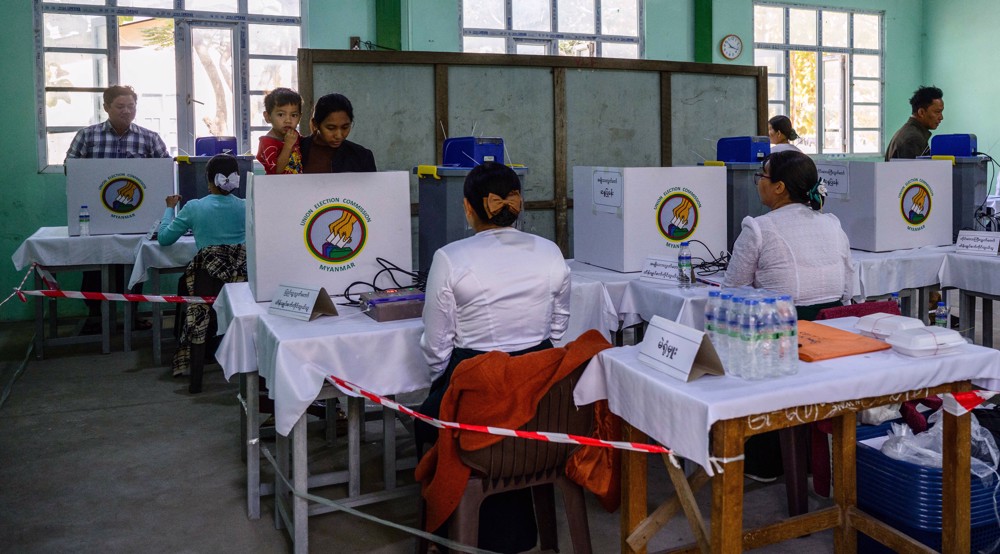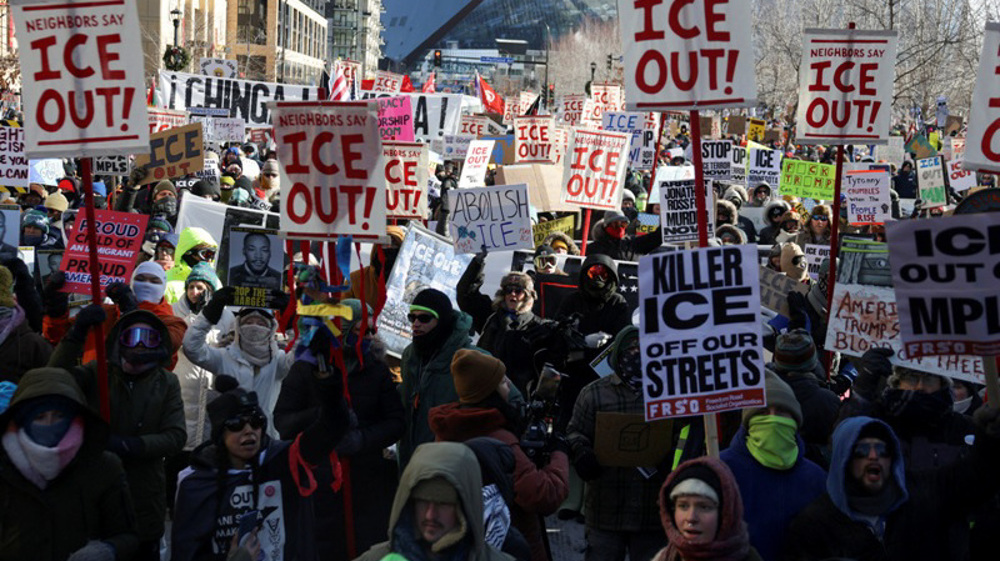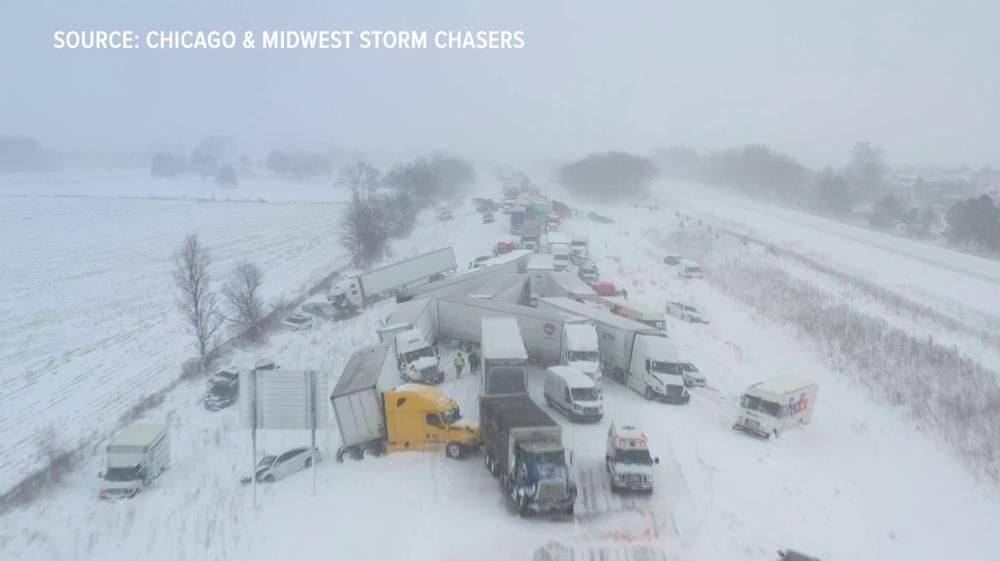Full News- Wed, June, 24, 2015 - 22:00 GMT
1- The Syrian army deals another blow to ISIL terrorists in the central province of Homs, securing the perimeter of an oil field near the city of Palmyra. The Syrian army has taken control of the area surrounding Jazal oil field, which contains important sites for energy production. Syrian media say several terrorists have been killed in the ensuing clashes. The oil field was producing several thousand barrels of oil per day when functioning under normal conditions. Back in May, ISIL Takfiri terrorists captured the ancient city of Palmyra, home to Roman ruins. Meanwhile, another 19 ISIL terrorists have been killed in a failed attack on an Alawite village in the same province. The so-called Syrian Observatory for Human Rights says three government troops were also killed in the attack.
2- A car bomb explosion has ripped through a gathering of Sunni tribal leaders in Iraq, killing 14 people. ISIL takfiri terrorists have claimed responsibility for the attack in Diyala province. At least 24 other people were wounded. An Iraqi army colonel has said the Sunni tribe supported the government against ISIL terrorists. The group says a Tajik man carried out the terror attack. ISIL has suffered numerous setbacks in Iraq in recent months. The Iraqi army backed by volunteer forces has managed to push out the terrorists from many areas they had occupied.
3- Israel has once again threatened to attack civilian centers in Lebanon. Israeli Air Force chief Amir Eshel made the comments in an interview with a German paper. As our correspondent Lamees Karout reports, analysts believe such comments are aimed at intimidating the Lebanese Resistance Movement Hezbollah.
4- It’s day 91 of Saudi Arabia’s war against its southern neighbor, Yemen, with airstrikes continuing unabated. Warplanes have launched airstrikes on the Maqash and Rahban regions in Sa’ada province. Earlier, they targeted a customs building in Harad district in Hajjah province. They also hit a government complex in the province of Jawf. The Saudi onslaught has left over 44-hundred people dead since it began three months ago. Casualties are mostly women and children. Saudi Arabia has intensified airstrikes over the past few weeks despite calls for a humanitarian pause to allow aid into the country.
5- Yemen’s Ansarullah movement and allied army units have opened fresh retaliatory fire on Saudi Arabia. Yemeni fighters fired a dozen rockets at a military base and surrounding areas in the Jizan region. There is still no word on possible Saudi casualties from the attack. Yemeni forces have stepped up their retaliatory operations on Saudi border region in a bid to put pressure on Riyadh to halt its aggression against their country.
6- The UN envoy for Yemen says the war-torn country is "one step away from famine" amid ongoing Saudi attacks on its southern Arab neighbor. Ismail Ould Cheikh Ahmed said 21-million Yemenis are in need of humanitarian assistance compared to seven-million just two years ago. The UN official, who mediated talks between Yemeni parties in Geneva last week, added that despite the failure to reach any agreement, there is an emerging common ground between the parties. He also called for a humanitarian pause during the holy month of Ramadan as a first step for a sustainable ceasefire.
7- A court in Tunisia has sentenced ousted ruler Zine El Abidine Ben Ali, his son-in-law and 3 of his aides to 10 years in prison for corruption. Millions of Tunisians are still waiting for the prosecution of the fugitive ruler and his agents for their past crimes.
8- Turkey says it is holding talks with Israel to restore bilateral relations which deteriorated after Tel Aviv’s deadly attack on a Gaza-bound aid vessel. Israeli media earlier reported that top Israeli and Turkish officials held secret talks on reconciliation in Rome on Monday. In 2010, Israeli commandos raided a Turkish-flagged ship in an aid flotilla, which tried to break the Israeli blockade on the Gaza Strip. Nine Turkish activist died in the attack and one more died in hospital after four years in a coma. Following the deadly assault, Turkey expelled the Israeli ambassador. Ankara also demanded a formal apology, compensation for the families, and also an end to the Israeli siege on Gaza. In March 2013, the Israeli prime minister formally apologized to the then Turkish Prime Minister Recep Tayyip Erdogan.
9- UN Chief Ban Ki-moon is calling on Israel to ease restrictions on Palestinians who want to travel from the Gaza Strip to the occupied Jerusalem al-Quds. Ban encouraged Israel to take measures to allow movement of people and goods between Gaza and the West Bank. His comments came in response to an earlier announcement by Israel that it would revoke al-Quds entry permits for 500 Gazans for prayers this week. The decision was announced after Israeli warplanes carried out a number of airstrikes on Gaza. Israel says the raids and the permit cancellations were a response to a rocket fired from Gaza into southern Israel. A Salafi group in Gaza has claimed responsibility for the rocket attack.
10- Greece’s bailout talks have once again ended without a breakthrough as rifts between Athens and its international creditors over suggested reform plans remain in place. Eurogroup chief Jeroen Dijsselbloem says the two sides have not reached a deal yet, but are determined to try to make it on Thursday talks. Athens rejected a counter-proposal by its European creditors over divisions on reform plans. Greek Prime Minister Alexi Tsipras is to hold a meeting with European Commission President Jean-Claude Juncker. Meanwhile, U-S and global stock markets fell on Wednesday as investors are losing hopes that a deal will be reached soon. The debt-ridden Greece needs a deal to release a last batch of loans worth seven-point-two billion dollars to avoid a default at the end of June.
11- Police in the UK have forced out a group of disabled people from the parliament building in the capital London following a protest over benefit cuts. The protesters were trying to enter the House of Commons during Prime Minister David Cameron’s question session. They are angry over government’s decision to end the Independent Living Fund. The program, which is set to be closed at end of June, provides vital support for nearly 20-thousand disabled people across Britain. A group of campaigners also held a protest rally outside the parliament to show their anger at the decision.
12- French lawmakers pass a controversial piece of legislation giving intelligence services widened spying powers. Under the law, intelligence agencies are allowed to place recording devices in terrorism suspects’ homes and cars without prior authorization from a judge. Spy agencies would also be empowered to hack into computers and devices and spy on the communications of anyone who makes contact with a person under suspicion. Human rights organizations argue such US-style massive data sweeps will undermine internet users’ privacy and they could be subject to serious abuse. The law will come into force after a court rules it is not in violation of the Constitution.
13- The Netherlands, Malaysia and three other countries are trying to have the UN Security Council set up a tribunal for the case of Flight MH-17 which was downed over Ukraine last year, Malaysia is reportedly expected to present a draft resolution to the Security Council next month. The other three countries are Australia, Belgium and Ukraine. They believe a UN tribunal is the best option to try those responsible for downing the Malaysia Airlines flight. All 298 passengers and crew on board Flight MH-17 died when the plane was shot down on July 17 last year. Malaysia is hoping that the council will adopt the measure on July 22 to mark the one-year anniversary of the first resolution passed just days after the tragedy.
14- The European Union has been accused of supporting fascists in Ukraine. At a conference in Brussels, experts claimed that the West is using Ukraine to prolong tensions with Russia so as to justify the existence and expansion of NATO. The conference coincided with an announcement from NATO that the alliance is to boost its military presence in Eastern Europe.
15- Pakistan's government has declared a state of emergency in the southern province of Sindh amid rising casualties caused by a severe heat wave there. At least 850 people have lost their lives in Sindh over the past four days. The majority of them died in the provincial capital Karachi. The death toll has kept rising despite a gradual drop in temperatures over the past three days. Three-thousand people have also been affected by heatstroke and dehydration. The local administration in Sindh province has declared Wednesday a public holiday to encourage the people to stay indoors. Multiple daily power outages as well as water shortages have triggered the situation.
'Militia that kills’: Milan mayor says US ICE agents not welcome at Winter Olympics
CIA-Mossad footprint turned Iran’s peaceful protests into ‘full-scale street war’: Analyst
VIDEO | Press TV's news headlines
Economic protests and subsequent terrorism in Iran
Court docs show Trump sought to deport student over pro-Palestine op-ed
Any harm to Ayatollah Khamenei a declaration of war on Shias: Lebanese cleric
Discover Iran: Hormozgan’s strategic ports powering trade, commerce and connectivity
VIDEO | Store, gym set on fire by masked rioters during recent unrest in Tehran









 This makes it easy to access the Press TV website
This makes it easy to access the Press TV website